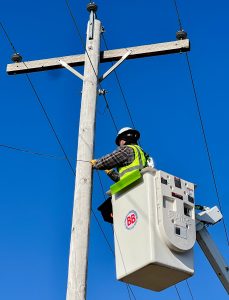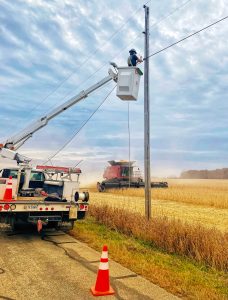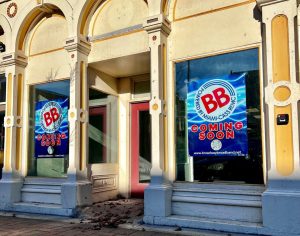It’s been like a perfect storm, honestly, in terms of the opportunity. Over the last few years, there was a wakeup call for internet needs…. The timing was just impeccable.
– Mike Barron
Director of Marketing & Member Services
Miami-Cass REMC
Some rural north central Indiana families and businesses soon will be powered by more than electricity from their local electric cooperative.
Broadway Broadband broke ground this month on its project to install fiber optic cable that will provide high-speed internet to homes and buildings in the city of Delphi, Indiana. It’s just one phase of the internet provider’s journey to install 2,000 miles of fiber optic cable for up to 18,000 families and businesses in northern Indiana. Broadway Broadband is owned by Miami-Cass REMC, an electric cooperative based in Peru, Indiana, that provides electricity to more than 6,000 consumers in the region.

A Broadway Broadband construction crew member installs a fiber optic cable. Broadway Broadband, which is owned by Miami-Cass REMC, is installing the cable as part of a multi-year effort to provide high-speed internet access to several North Central Indiana counties.
“We are delighted with the reports that we have received in terms of the internet speed and reliability for Broadway Broadband, and we have found that the people there are really good to work with,” said Anita Werling, mayor of Delphi. “They’re very community oriented. We’re really pleased with the company.”
The reliable high-speed connections will be vital for local businesses, as many conduct credit card and other business transactions over the internet, Werling said.
The city of Delphi received more than $600,000 from the American Rescue Plan that will fund part of the project. Broadway Broadband has received additional funding for installing fiber optic cable in Miami County and Cass County. In all, the organization received more than $12.9 million for its fiber installation, about 60 percent of the total cost.
“It’s been like a perfect storm, honestly, in terms of the opportunity,” said Mike Barron, director of marketing and member services for Miami-Cass REMC. “Over the last few years, there was a wakeup call for internet needs around north central Indiana. The timing was just impeccable.”
In summer 2019, Miami-Cass REMC began discussions with Broadway Broadband, already an existing wireless internet provider, about installing fiber to the utility’s owned infrastructure. While planning an initial project, Miami-Cass employees began discussing a purchase with the company.

A Broadway Broadband construction crew member installs fiber optic cable on a pole. Broadway Broadband has partnered with multiple government agencies and secured more than $12.9 million to connect northern Indiana communities and counties to high-speed broadband internet access.
“We could have better input over maintenance and service if we owned the company compared to if we just contracted with Broadway Broadband,” said Matt Mavrick, information technology director for Miami-Cass REMC and Broadway Broadband. “Also, investing in our community was a significant consideration. We were going to bring jobs and add more jobs because of these projects coming to fruition.”
The initial project was estimated to cost about $2.1 million to install 147 miles of fiber optic cable. The project also had potential to reach up to 1,100 people who did not yet have high-speed internet access. The new internet business owners talked with nearby local and civic leaders and discovered there was an interest in expanding coverage.
“A lot of the areas we are going into are so rural that we are the first ones to get there,” Mavrick said. “Some homes have satellite internet, but as far as fiber or cable providers, it’s slim to none in a lot of these areas.”
The last few years highlighted the new possibilities with broadband access that people previously may not have considered, such as with health care, said Brian Anderson, director of economic development for Wabash Valley Power Alliance. WVPA is the wholesale power provider for Miami-Cass REMC.
“There are certain things that need in-person interaction, but for consultations and other meetings, if you have access to high-speed broadband, you can meet virtually or send medical files,” Anderson said. “The new possibilities that stem from access to high-speed internet can be incredibly important to helping people.”

The storefront for Broadway Broadband’s office in Delphi, Indiana. Miami-Cass REMC owns Broadway Broadband, which has partnered with the city of Delphi to offer high-speed broadband internet to the city.
Organizations including government agencies have underscored high-speed broadband’s importance by allocating funding and grants to connect rural areas and other parts of the nation lacking broadband access, Anderson said.
Some electric cooperatives have seen the parallel in their history of providing electricity to rural parts of the nation to the situation with broadband. More electric co-ops such as Miami-Cass REMC have taken an active role to connect communities they serve to high-speed internet.
“Ideally, a co-op member who has access to high-speed internet is a member who will be more easily retained and healthier, happier, and experience a better quality of life,” Anderson said. “Hopefully, all of these things will lead to more successful outcomes for their community.”

